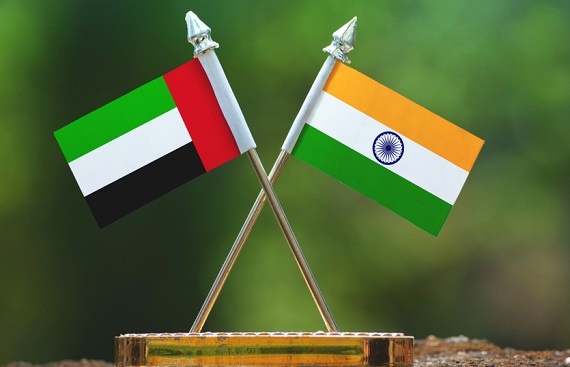India, UAE Strengthen Ties with $100 Billion Non-Oil Trade Goal

- India and UAE set a $100 Billion non-oil bilateral trade target under CEPA by 2030 amid shifting global trade dynamics.
- Ministers Piyush Goyal and Thani bin Ahmed Al Zeyoudi discussed collaboration in renewable energy, digital infrastructure, supply chain resilience, healthcare, and traditional medicine.
- Key initiatives include the Local Currency Settlement System (INR-AED), Bharat Mart, APEDA’s Bharati Scheme, and India as partner nation for Gulf Food 2026 in Dubai.
India and the United Arab Emirates (UAE) have committed to taking their Comprehensive Economic Partnership Agreement to a higher level with a $100 billion target for bilateral non-oil trade as world trade dynamics change following the sudden increase in US tariffs announced by US President Donald Trump.
The matter was deliberated during a meeting organized by Union Minister of Commerce & Industry Piyush Goyal with the UAE's Minister of Foreign Trade, Thani bin Ahmed Al Zeyoudi on further enhancing the India-UAE Comprehensive Economic Partnership Agreement (CEPA), as per an official statement released on Monday.
The ministers examined progress achieved under the CEPA and reiterated the common vision of developing bilateral trade towards reaching the goal of $100 billion non-oil, non-precious metals trade by 2030. The discussions entailed cooperation in emerging areas like renewable energy, digital infrastructure, supply chain resilience, and healthcare. Both ministers stressed the need for strong cooperation in the present global environment to enhance the bilateral economic partnership.
Goyal underscored the strength and resilience of the Indian economy, which has helped it shoot ahead in difficult times. The two sides concurred that working with diverse partners would be of mutual benefit. Both the sides emphasized the need for sharing trade data on a timely basis for enhanced monitoring under the CEPA and agreed that the Sub-Committee on Services will meet in two months' time.
The Indian side also appreciated the establishment of the Emirates Drug Establishment and its contribution to resolving issues of Indian pharmaceutical companies. On market access and regulatory matters, both ministers agreed to raise the issues for early settlement in the CEPA Joint Committee.
Also Read: IIT Kharagpur Establishes Committee to Enhance Mental Health Support on Campus
Goyal welcomed the UAE’s growing investments in India’s infrastructure, logistics, and food processing sectors, and appreciated Dr Thani’s leadership in advancing multilateral trade cooperation. The ministers noted the importance of initiatives such as the Local Currency Settlement System (INR-AED) and Bharat Mart in the UAE as enablers of trade facilitation.
The session highlighted the India-UAE partnership as a characterizing partnership of the 21st century, based on innovation, sustainability, and mutual prosperity. The two ministers also co-chaired stakeholder sessions with officials of the pharmaceutical and food industries.
In the pharmaceutical industry, important issues were addressed in terms of changing geopolitical issues. The two sides shared opinions on how further ease trade in pharmaceuticals and healthcare products. The UAE side expressed a positive sentiment for speeding up registration procedures and regulatory facilitation, while the Indian side emphasized its willingness and preparedness for inspection and audit by UAE authorities.
Discussions also centred on new opportunities in traditional medicine, with specific focus on ayurvedic products under the India-UAE collaboration. In the food industry, the APEDA introduced the Bharati Scheme to incubate food and agritech start-ups, whereby over 100 companies will be facilitated to develop and expand brands and establish business-to-business collaborations.
The APEDA also entered into an MoU with DWTC to make India the partner nation in the 2026 Gulf Food, Dubai. Indian firms in the segments of food, marine, tea, coffee and spices will have exhibition space in excess of 1200 sqm. The UAE side responded to issues of the Indian food and beverages sector such as those pertaining to high retail prices, price norms and obligatory testing for rice consignments.
